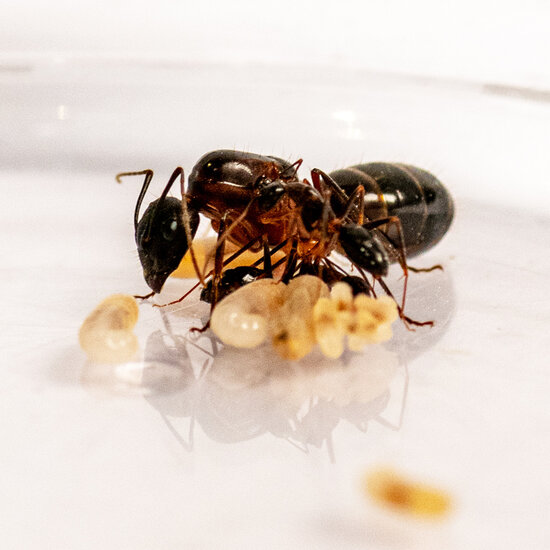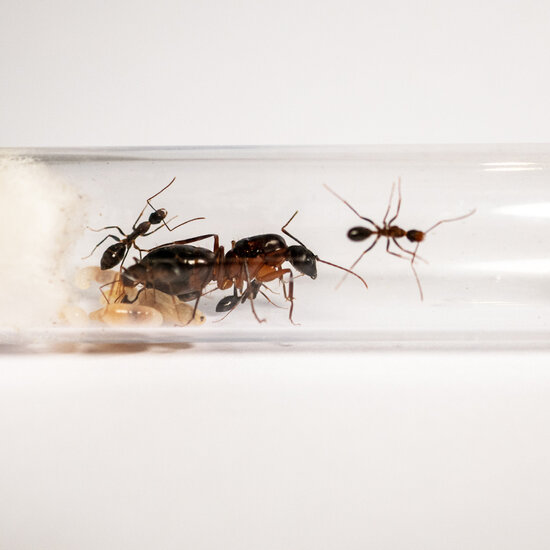



- Ants as pets since 2009 It starts here!
- We ship every working day until 4:30 PM
- Flat shipping costs from €6.99
- Specialists in ants, free advice
Do you have questions about this product?
Or do you need help? Please feel free to contact us, we are happy to help!
Product description
Camponotus barbaricus ant colony 2-5
Species
The Camponotus barbaric ant belongs to the biggest ant families in the world. Especially the queen, but also the majors from bigger colonies are impressive in size. That is why they are also called the giant ants. Our ant colonies consist of a queen with some workers and depending on the phase also some breed. This depending on the number of eggs that has developed itself to ant (egg-larve-pupa-ant). This colony consist of 2 to 5 workers and these workers are raised by the queen ant herself. The queen lays eggs in phases.
Suitable for
The ant colony is intended for the ant farms of acrylic, gypsum and sand. We also recommend the use of an arena. The ants use the arena to get their nourishment and bring their garbage. Some of our products and offers have integrated an arena. For the first period of time the test tube has enough space for the colony. So they develop from the test tube.
On several Ant Farms You can find this ant colony in a special offer price. If you are looking for ants to use in a gel ant farm, we recommend the ant family.
Nutrition
The nutrition set above is a complete diet for this ant species. The set includes sugar water, honeydew, and fruit flies. This start set is sufficient for the first few months.
Packing and Shipping
In the image you see how we actually supply the ant colony. The colony is in a test tube with a water supply in order to keep the tube nest partially damp. After receipt the colony can be kept in the tube up to a few weeks without any care. We give a 2 weeks warranty for the life of the queen. Does the queen arrive dead or if she dies within a few weeks, we will provide a replacement colony for free.
Specifications and information
Common use name
Giant Ants
Scientific name
Camponotus barbaricus
Difficulty class
3. Advanced
This species grows and develops slowly. A lot of patience is needed and they are very critical with nutrition. Therefor it is a relatively difficult species to keep.
Queen | Gyne:
14-16 mm
Workers:
6-12 mm
How bigger the colony, how bigger the ants in size.
Minor, Media en Major (soldiers).
Type colony:
Monogyn, 1 queen per nest.
Type nest:
Sandnests, often under stones.
Temperature:
Room Temperature or more, 20-30 graden
Hibernation:
No, but a rest period. Our advice: slightly cooler with temperatures around 15 degrees during November-February. For example in the basement, a cooler attic or barn.
Our experience: even if you keep this species in winter on room temperature the ant colony will develop well.
Nutrition:
Seeds, sugar or honey water and small insects
Our advice for smaller colonies: fruit flies.
Humidity:
Our advice: Keep the nest part from your Ant Farm partially moisture.
This species likes it a bit more dry then other species like Lasius
niger and Myrmica rubra.
Districution:
(South)Europe and (North)Africa
Ant Farm Advice:
Acrylic, gypsum or sand, including the use of an Arena
Comments:
The ants in this colony are impressive in size. They become big, are beautiful to see and are very fast. So make sure for a well-closed nest and arena if you want to grow this ant species. Especially the beginning of the colony comes very precisely. A lot of rest, good nutrition and patience is needed.
Camponotus barbaricus ant colony 2-5
Species
The Camponotus barbaric ant belongs to the biggest ant families in the world. Especially the queen, but also the majors from bigger colonies are impressive in size. That is why they are also called the giant ants. Our ant colonies consist of a queen with some workers and depending on the phase also some breed. This depending on the number of eggs that has developed itself to ant (egg-larve-pupa-ant). This colony consist of 2 to 5 workers and these workers are raised by the queen ant herself. The queen lays eggs in phases.
Suitable for
The ant colony is intended for the ant farms of acrylic, gypsum and sand. We also recommend the use of an arena. The ants use the arena to get their nourishment and bring their garbage. Some of our products and offers have integrated an arena. For the first period of time the test tube has enough space for the colony. So they develop from the test tube.
On several Ant Farms You can find this ant colony in a special offer price. If you are looking for ants to use in a gel ant farm, we recommend the ant family.
Nutrition
The nutrition set above is a complete diet for this ant species. The set includes sugar water, honeydew, and fruit flies. This start set is sufficient for the first few months.
Packing and Shipping
In the image you see how we actually supply the ant colony. The colony is in a test tube with a water supply in order to keep the tube nest partially damp. After receipt the colony can be kept in the tube up to a few weeks without any care. We give a 2 weeks warranty for the life of the queen. Does the queen arrive dead or if she dies within a few weeks, we will provide a replacement colony for free.
Specifications and information
| Common use name | Giant Ants |
| Scientific name | Camponotus barbaricus |
| Difficulty class | 3. Advanced This species grows and develops slowly. A lot of patience is needed and they are very critical with nutrition. Therefor it is a relatively difficult species to keep. |
| Queen | Gyne: | 14-16 mm |
| Workers: | 6-12 mm How bigger the colony, how bigger the ants in size. Minor, Media en Major (soldiers). |
| Type colony: | Monogyn, 1 queen per nest. |
| Type nest: | Sandnests, often under stones. |
| Temperature: | Room Temperature or more, 20-30 graden |
| Hibernation: | No, but a rest period. Our advice: slightly cooler with temperatures around 15 degrees during November-February. For example in the basement, a cooler attic or barn. Our experience: even if you keep this species in winter on room temperature the ant colony will develop well. |
| Nutrition: | Seeds, sugar or honey water and small insects Our advice for smaller colonies: fruit flies. |
| Humidity: | Our advice: Keep the nest part from your Ant Farm partially moisture. This species likes it a bit more dry then other species like Lasius niger and Myrmica rubra. |
| Districution: | (South)Europe and (North)Africa |
| Ant Farm Advice: | Acrylic, gypsum or sand, including the use of an Arena |
| Comments: | The ants in this colony are impressive in size. They become big, are beautiful to see and are very fast. So make sure for a well-closed nest and arena if you want to grow this ant species. Especially the beginning of the colony comes very precisely. A lot of rest, good nutrition and patience is needed. |
Reviews
No reviews yet
More information...
If you have any questions, please don't hesitate to contact us, we like it! You can reach us via email and WhatsApp. You are welcome in the showroom by appointment for advice and purchase!
Customer service Make an appointment
